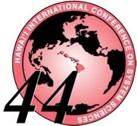Security & Critical Infrastructure Minitrack

Co-chairs
Gregory B. White (Primary Contact)
Center for Infrastructure Assurance and Security
The University of Texas at San Antonio
6900 North Loop 1604 West
San Antonio, TX 78249, USA
Phone: +1210-458-6307
Fax: +1-210-458-2170
Email: greg.white@utsa.edu
Wm. Arthur Conklin
Department of Information & Logistics Technology
College of Technology
University of Houston
312 Technology Building
Houston, TX 77204, USA
Phone: +1-713-743-1556 (o)
Fax: +1-713-743-4032
Email: waconklin@uh.edu
Barbara Endicott-Popovsky
Center for Information Assurance and Cybersecurity
University of Washington
4311 11th Ave NE, Suite 400, Box 354985
Seattle, WA 98105, USA
Phone: +1-206-284-6123
Fax: +1-206-216-0537
Email: endicott@u.washington.edu




Information Technology has become pervasive in all aspects of our lives and increasingly are involved in critical infrastructures. Governments have also embraced IT to interface with citizens in a more efficient manner. Security issues have risen to the forefront as a result of data disclosures and identity theft incidents discussed in mainstream media. Other issues include intellectual property theft and criminal acts involving computers. Although 85% of the US critical infrastructure components are privately owned and operated, government has a place at the table regarding regulation and operating rules. This minitrack examines aspects associated with the security of information technology used by governments and critical infrastructures and explores ways that IT can enhance the ability of governments to ensure the safety and security of its citizens. Topics can range from technical, to process, to people-related as security is a result of these main topics working together.
Topics and research areas include, but are not limited to:
-
-Systems for governments to respond to security events
-
-Protection of Critical Infrastructures
-
-Information Assurance and Trusted Computing
-
-Security Related Information Sharing
-
-Information Security Economics
-
-Information Warfare
-
-Incident Response
-
-Digital Forensics
-
-Privacy and Freedom of Information
-
-Security Management
-
-Laws and Regulation of IT Security
-
-Security concerns of new technologies, i.e. Social Media, mobile computing
-
-Government Disaster Recovery and Business Continuity
-
-Case Reports Related to Security Experiences Within Government
More co-chair information
Dr. Gregory B. White is the Director of the Center for Infrastructure Assurance and Security at The University of Texas at San Antonio. He has been involved in computer security for over 20 years and has published extensively on the subject. His research interests currently include community cyber security, security visualization, mini-botnet detection and eradication, and critical infrastructure protection. He is the creator of the Community Cyber Security Maturity Model (CCSMM) and is also involved in security competitions at both the collegiate and high school levels
Wm. Arthur Conklin, CISSP, CSSLP is an Assistant Professor in the Information and Logistics Technology department of the College of Technology at the University of Houston. He received his Ph.D. in Business Administration, from The University of Texas at San Antonio (UTSA), with specialization in Information Systems. Currently a founding member of the Center for Information Security Research and Education (CISRE) at the University of Houston, Dr. Conklin has previously served as the Technical Director for the Center for Infrastructure Assurance and Security (CIAS) at The University of Texas at San Antonio. His research interests include the use of systems theory to explore information security, specifically in Cyber Physical Systems (CPS), and the measurement of security through regulation and metrics. He has an extensive background in secure coding and is a member of DHS Software Assurance Forum working group for workforce education and development. A frequent speaker on information security, he has authored numerous academic publications on security and is a co-author on four books on information security.
Barbara Endicott-Popovsky is the Director for the Center of Information Assurance and Cybersecurity at the University of Washington, designated by the NSA/DHS as a Center for Academic Excellence in Information Assurance Education and Research. She holds a joint faculty appointment with the Information School and the School of Urban Design and Planning--Critical Infrastructure, following a 20-year industry career marked by executive and consulting positions in IT architecture and project management. Her research interests fall under the umbrella of managing/mitigating network risks: deception, governance and network forensic

“Secure Cyberspace is Essential for the Trust in 21st Century Government”






